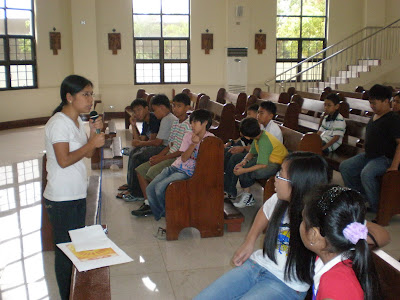Rich Young Man
In this story of the rich young man, we see the three stages of all growth in holiness – the path we have to follow as well if we want to be better people.
The first stage is what we might call essential holiness – keeping the commandments. That is quite an accomplishment in itself, and most of us have to struggle to maintain this basic holiness. Regular Mass and prayer, fundamental love and acceptance of one another, not to cheat or steal or lie – these are not easy things to do in our human weakness, in our love of pleasure and comfort. But they are the essentials and the beginning of all holiness.
The highest level of holiness is to follow Christ. But to do that, to make that final surrender of love to the Lord, we have to get rid of all the baggage that gets in the way between us and God. The spiritual writers use the word “detachment.” We have to be detached from the persons, places and things that get between us and God, because they block our love and growth in holiness. We have to eliminate in our lives everything – a person, places or things – which is keeping us from becoming holier people. We have to get rid of the sinful relationships, the friends or the sinful actions that are dragging us down.
But not all of us can do that, because it is hard to give up all those things that we like so much.
Jesus was pleased with the young man and challenged him to rise to this second stage of holiness. He said, “Go sell what you have and give it to the poor.’ But the young man couldn’t do it. He had too many attachments, too much excess baggage. Matthew and Mark says he was very rich. Luke says he came from one of the leading families of the town. He was a good man, but he had too much baggage to follow the Lord all the way.
To simplify our attachment and to get rid of our excess baggage, we have to sacrifice. We have to give it up. As one of the writers says: “We have to die a little bit.” That’s a hard thing to do, and in the daily choice between pleasure and sacrifice, pleasure almost always wins out. We are good people, we do love the Lord, but we also want the trip to Hong Kong or the new dress. It isn’t a question of being good or bad, because we are good. It’s a question of being better. And that’s what the rich young man couldn’t handle- the sacrifice needed in being better.
Once we have simplified our lives and minimized our attachments, once we have learned to ‘give things up to the Lord,” we are ready to the third stage of holiness, which is to follow Christ. This stage is the challenge of total surrender to what the Lord wants- a long life or a short one, success or failure, sickness or health. They’re really all the same, because the only thing that matters is what God wants.
Mary had that surrender when she said “yes” to the angel’s message at Nazareth. Christ had it in the garden that night before He died when He prayed to His Father: “Don’t do what I want. Do what You want.” Samuel had it in the temple when he said: “Here I am, Lord, what do you want me to do?” One of the most difficult things in the world is to tell God: Never mind what I want. You do what is best.” But that’s what it means to “follow the Lord.”
Following the Lord means openness to what God wants from us, and not a stubborn insistence that our way is best. It means self-transcendance. We have to go above and beyond our own petty needs and selfish desires. Following the Lord means being vulnerable, because surrender to the Lord often means that we will be hurt or rejected, or have to suffer in one way or another.
How the young man responded to the challenge of detachment and surrender changed his whole life. He could have been better, but he chose not to. And we ought to, since God is never satisfied when we are just good. He always wants us to be better.
.
Bong : http://s533.photobucket.com/albums/ee336/_bongertz_/se%20grand%20reunion/?albumview=slideshow
http://s533.photobucket.com/albums/ee336/_bongertz_/se%20grand%20reunion/?albumview=grid
.
Rino : http://rapidshare.com/files/140669953/SE-GrandReunion-Pix-Rino-1.rar.html
http://rapidshare.com/files/140677184/SE-GrandReunion-Video-Rino.rar.html
http://rapidshare.com/files/140681783/SE-GrandReunion-Pix-Rino-2.rar.html
HEAR YE! HEAR YE!
Speakers' Summit - Second Wave
.
Our goals for the Summit are simple, but bold: (1) to build a pool of speakers as we raise awareness of how we, sinners as we are, could be used by God to fulfill His will on this earth; (2) to promote greater participation in spreading His Word among the youth members, and in by doing so, strengthen one's own faith; and (3) to discover hidden strengths in each of the participants that could be used as tools to strengthen each and everyone in the community.
.
Please bring your Bible, some snacks, a small blanket and a throw pillow. Bring also some lunch money.
.
We hope you will be able to accept our invitation to join us in this effort.
.
Vocation
What is a vocation? A vocation is a response to God where a young person discovers they are called to the vocation of Marriage or Priesthood or Religious Life.
It varies in length for each individual, but leads each person to his or her own peace - to the place where, through prayer and discernment, they rely on Christ leading them to the vocation which will bring about the most holiness.
In this process the young person seeks God's will by allowing him to show them which vocation it is. Unless both marriage and religious life are reflected on, God's will is not sought in its fullness.
The vocation cannot be understood from a distance. Most young people say they aren't called to be a priest or sister, and yet they have never visited a convent or monastery or experienced Diocesan priesthood. When Jesus called the apostles he said, "come after me," and " follow me." That meant we must search out our vocation in life
How does a person begin to know?
1. First, you must pray so that God will reveal it to you! And not just two minutes but something like praying a rosary or half an hour of adoration in the front of Christ.
2. Second, you seek counsel to ask advices. When people judge on their own, very often they are deceived. Speak with a holy priest, sister or brother about some questions you have.
3. Third, go and see! If you are discerning marriage, be around holy couples! If you are discerning being a religious sister, go to a convent, make a nun run as mapped out on this webpage and be with the nuns. If you are discerning priesthood, visit a Diocesan priest or Religious monk and be with them.
4. Fourth, develop the virtues of patience and perseverance. Patiently wait on what God wants to show you. Some people expect answers quickly; it may happen but God usually goes slowly. He also wants you to persevere! That way he walks you through life, and in your faithfulness you come through a stronger person.
Special Charisms Seminar
.

SPECIAL CHARISMS SEMINAR
HJM SPIRITUAL CENTER, CUBAO, QUEZON CITY
21-22 June 2008.
.
ALL who have taken Youth Growth In The Spirit Seminar (YGSS ) and who have sponsored a YGSS class are cordially invited!
Hear Ye!
.
.
.
We,

Riño & Rose
.
humbly extend our deepest gratitude to Our Almighty God
as we sealed our love with an eternal bond
at the St. Augustine Catholic Parish (Paoay Church)
in Paoay, Ilocos Norte
.
Reception followed at Asiao’s Residence in
No. 69 Castro Street, No. 12 Palpalicong, Batac City, Ilocos Norte
SrKids Encounter


Although we had a heat wave of the summer we still had a COOL time! Enjoy the pictures and seeing all our hard work come to life!
.

The season of Lent, beginning with Ash Wednesday, is devoted to an intensive study of the Passion of Christ, this feature becoming unusually pronounced in Holy Week, with the culmination in the great happening of Good Friday, in the death and burial of Christ. The length today of the Lenten season is for forty days. While such a period is indicated as early as the third century, Apostolic Tradition, its length is indefinite prior to Nicaea. Thereafter it is spoken of as the fast of forty days and spans a period of six weeks with prior to Easter (as in Rome and fourth-century Alexandria) or prior to Holy Week (as in Syria, Constantinople, and eventually all the Eastern churches). In the early church the Lenten season was a time for the catechumens to make preparations for baptism, but by the end of the fourth century in the West it was also a period for the ritual of humiliation of the penitent. This led to the Christian liturgical traditions that observe the Lenten fast experience as a time of "dying to self," so as to participate fully in the renewal of life in the celebration of Christ's resurrection. The custom of fasting during Lent started at a very early date, but the length of the fast varied, eight days being customary at first, but the time was extended to forty days, after the analogy of the period included in the Lord's temptation, Matt. 4:2. Gregory II, is said to have fixed the Wednesday now known as Ash Wednesday (from the custom of daubing the foreheads of the worshipers on that day with the ashes of last year's palms, in token of mourning) as the first day of Lent in order to secure uniformity of observance throughout the Church. The season of preparation for Easter closed with the Great or Black Week, also known as the Holy Week.
.
.
. .
 .
..
 .
..

.


.

.




















